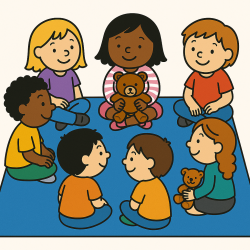Enhance Oracy in Early Years
The Importance of Oracy in Early Years
Oracy is the foundation of all early learning, providing children with the essential skills to express their thoughts and ideas effectively. In the Early Years, communication is not merely about talking; it is about building the confidence to participate in all aspects of learning. Establishing oracy at this stage ensures that children are able to share ideas, ask questions, and actively engage with their peers and teachers. This early focus on verbal communication lays the groundwork for lifelong learning and social interaction. 
When children develop strong oracy skills, they are better prepared to tackle the challenges of reading and writing. The ability to articulate thoughts verbally precedes and supports the development of writing skills, making oracy a critical precursor in literacy.
Understanding Oracy: Foundations of Language and Communication
Oracy encompasses the art of speaking and listening, forming the core of effective communication in the EYFS. It involves a blend of vocabulary use, pronunciation, tone, and the ability to structure thoughts coherently. At its essence, oracy is about more than just words; it builds a foundation for confidence and interpersonal skills. This comprehensive approach makes oracy a vital component of early education, ensuring that children are well-equipped to participate in all aspects of learning.
Listening actively and speaking clearly are critical skills that support vocabulary expansion and understanding. By engaging in thoughtful dialogue, children learn to listen attentively, understand differing viewpoints, and refine their own ideas. These abilities also help foster a sense of community within the classroom and improve overall communication skills. As children develop their vocabulary through interactive discussions, they are better placed to succeed academically and socially.
How Oracy Enhances Literacy and Academic Success
Structured oral activities in the classroom lead to significant improvements in literacy outcomes. When children are encouraged to talk through their ideas, they gain a deeper understanding of sentence structures and story sequencing. Oral language practice aids in cementing the connections between spoken and written language. This direct correlation between speaking well and writing effectively underlines the importance of oracy in achieving academic excellence. 
Studies have shown that children who engage in regular oracy activities demonstrate enhanced reading comprehension and writing skills. For example, classrooms that integrate lively discussions and story-telling sessions often report a noticeable improvement in literacy levels. Teachers find that interactive learning builds confidence and critical thinking, setting a strong foundation for future academic challenges. The academic benefits of enhanced oracy skills are clear, with evidence pointing to overall improvements in communication and learning outcomes.
Mighty Writer: Making Oracy Fun and Accessible
The Mighty Writer resource is designed to bring oracy to life. This innovative tool uses vibrant image tiles, sentence clouds, and various symbols to represent different parts of a sentence, turning the process of speaking and retelling stories into an interactive experience. Its visual and hands-on approach captures the attention of children who might otherwise find language activities daunting. By integrating playful elements with educational content, Mighty Writer transforms the classroom into a space where oracy is celebrated and explored.
With Mighty Writer, children are encouraged to experiment with sentence construction and storytelling in a fun and accessible way. The tool provides a platform for learners to build their vocabulary and experiment with language without the pressure of traditional written tasks. By fostering an environment where creativity and expression are prioritised, Mighty Writer supports the natural flow of oral communication. This approach not only boosts literacy results but also makes learning an enjoyable, everyday adventure.
Learn More About Mighty Writer
Practical Strategies for Integrating Oracy in EYFS Classrooms
Embedding oracy into daily classroom routines can transform the learning environment by making communication an integral part of every lesson. Teachers can incorporate regular discussion sessions, story-telling, and group activities that encourage children to share their thoughts openly. Simple strategies such as read-aloud sessions and role-playing activities foster a culture of verbal engagement. These practices help to build a routine where speaking and listening become second nature to all pupils.
Interactive activities, such as group discussions, debates, and collaborative storytelling, can make oracy practice both engaging and dynamic. Classroom adaptations, including dedicated 'talk time' and visual aids, further enhance the effectiveness of these strategies. Teachers who experiment with varied approaches often report increased pupil participation and improved language skills over time. Such practical interventions are critical in ensuring that every child develops strong oracy skills, paving the way for future success.
Conclusion: Building Confident Communicators for the Future
In conclusion, the early development of oracy is vital for building confident communicators who are prepared to meet academic challenges. The emphasis on talking, listening, and vocabulary development lays a robust foundation for both literacy and broader educational success. By integrating innovative resources such as Mighty Writer, teachers can make oracy a fun and integral part of the learning experience. The academic and social benefits of enhanced oracy skills extend far beyond the classroom, shaping well-rounded individuals for the future. It is clear that prioritising oracy in early education is not only beneficial but essential for the holistic development of every child.
Read Our Other Blogs
A Fun EYFS Show and Tell Oracy Activity
"Odd One Out" Literacy Lesson for Key Stage One
Transform Your KS1 Literacy - Ace Your Next Ofsted Inspection
